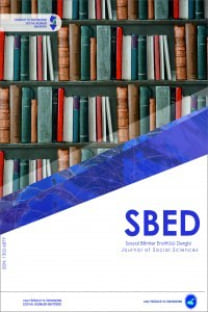Padovalı Marsilius’da Din-Siyaset İlişkisi
Bu çalışma modern siyasi düşüncenin öncüleri arasında yer alan Padovalı Marsilius’un din ve siyaset arasındaki ilişkilere dair düşüncelerini ele almaktadır. Marsilius’un bu çerçevedeki fikirleri modern siyaset düşüncesinin başlangıç aşamalarından biri olarak kabul edilir. Çünkü o, çok erken sayılabilecek bir dönemde, on dördüncü yüzyılda, siyasi ve dünyevi alanı din dışı bir bağlamda temellendirme girişiminde bulunmuştur. Marsilius, din ve siyaset ilişkisinde dinî otoritenin lehine olan kendi döneminin mevcut anlayışına karşı çıkmıştır. O, dünyevi konularda seküler otoriteyi tek yetkili ve meşru güç olarak kabul etmiştir. Dinî otoritenin dünyevi alanda düzenleyici güç olma iddiasını ise hak gaspı olarak görmüştür. Ona göre, ruhban sınıfı seküler iktidarın düzenlediği ve yönettiği toplumsal yapının unsurlarından herhangi biridir ve bir ayrıcalığı söz konusu değildir. Ruhban sınıfının dünyevi güç iddiası yetki aşımıdır ve nihai amaç olan toplumsal barış için en büyük tehdidi oluşturmaktadır. Seküler iktidar, gerekirse meşru zorlayıcı gücünü de kullanmak suretiyle ruhban sınıfını kontrol ederek bu tehditi bertaraf etmek durumundadır.
Anahtar Kelimeler:
Din sosyolojisi, Padovalı Marsilius, din - siyaset ilişkisi
The Relationship of Religion and Politics in Marsilius of Padua
This study deals with the thoughts of Marsilius of Padua, one of the pioneers of modern political thought, on the relations between religion and politics. The ideas of Marsilius in this framework are considered as one of the beginning stages of modern political thought. Because Marsilius, in the fourteenth century when can be considered too early, attempted to base the political and worldly realm in a non-religious context. Marsilius opposed the current understanding of his time, which was in favor of religious authority in the relationship between religion and politics. He recognized secular authority as the only authoritative and legitimate power in worldly matters. He saw the claim of religious authority to be a regulatory power in the worldly realm as a usurpation of rights. According to him, the clergy is any of the elements of the social structure organized and governed by the secular power and has no privileges. The clergy's claim to worldly power is an overstepping of authority and poses the greatest threat to social peace, which is the ultimate goal. The secular power has to eliminate this threat by controlling the clergy, if necessary, by using its legitimate coercive power.
___
- Ağaoğulları, M. A. ve Köker, L. (2013). Tanrı devletinden kral-devlete. İmge Yayınları.
- D’entrêves, A. P. (1959). The medieval contribution to political thought. The Humanities Press.
- Ebenstein, W. (2009). Siyasi felsefenin büyük düşünürleri (İ. Özel, Çev.). Şule Yayınları.
- Güngör, C. (2011). Marsilius’un siyaset kuramı: Defensor Pacis üzerine. Ankara Hacı Bayram Veli Üniversitesi Hukuk Fakültesi Dergisi, 15(4), 327-378.
- Koch, B. (2013). Religious freedom and majority rule: Marsilius of Padua “on” Abdullahi Ahmed an-Na‘im and the “Secular” Islamic State. Politics and Religion, 6(1), 121-144.
- Koch, B. (2012a). Marsilius of Padua on church and state. In G. Moreno-Riaño & C. J. Nederman (Eds.), A Companion to Marsilius of Padua (ss. 139-179). Brill.
- Koch, B. (2012b). Priestly despotism: The problem of unruly clerics in Marsilius of Padua’s Defensor Pacis. Journal of Religious History, 36(2), 165-183.
- Mairet, G. (2011). Padovalı Marsilius’dan Louis XIV’e laik devletin doğuşu. C. B. Akal (Ed. & Çev.), Devlet kuramı içinde. Dost Kitabevi Yayınları.
- Marsiglio of Padua. (1993). Defensor minor and de translatione ımperii (C. J. Nederman, Çev.). Cambridge University Press.
- Marsilius of Padua. (2006). The defender of the peace (A. Brett, Çev.). Cambridge University Press.
- Moreno-Riaño, G., & Nederman, C. J. (2012). Marsilius of Padua’s principles of secular politics. In G. Moreno-Riaño & C. J. Nederman (Ed.), A companion to Marsilius of Padua (ss. 117-138). Brill.
- Nederman, C. J. (1995). From “defensor pacis” to “defensor minor”: The problem of empire in Marsiglio of Padua. History of Political Thought, 16(3), 313-329.
- Sweeny, M. J. (2012). The spirituality of the church: Scripture, salvation, and sacraments. In G. Moreno-Riaño & C. J. Nederman (Ed.), A Companion to Marsilius of Padua (ss. 181-228). Brill.
- Vergin, N. (2000). Din, toplum ve siyasal sistem. Bağlam Yayınları.
- ISSN: 1302-6879
- Başlangıç: 2000
- Yayıncı: Yüzüncü Yıl Üniversitesi Sosyal Bilimler Enstitüsü Müdürlüğü
Sayıdaki Diğer Makaleler
15. ve 16. Yüzyıllarda Bolu Sancakbeyleri
Dijital Teknolojiler, Yapay Zekâ, Girişimcilik ve İnovasyon Yayınları Bibliyometrik Analizi
Eğitim Sanatı: Pedagojiden Andragojiye
Padovalı Marsilius’da Din-Siyaset İlişkisi
Kaplumbağa Figürünün Mitolojik Olarak İncelenmesi ve Anadolu Dokumalarında Kullanımı
Çin’in Deniz İpek Yolu Projesi: Gwadar Limanı
Ermeni Milliyetçiliği, Marksizm ve Ermeni Apostolik Kilisesi arasındaki İlişkileri Yorumlamak
Keisuke WAKİZAKA, Gökçe YILMAZ
